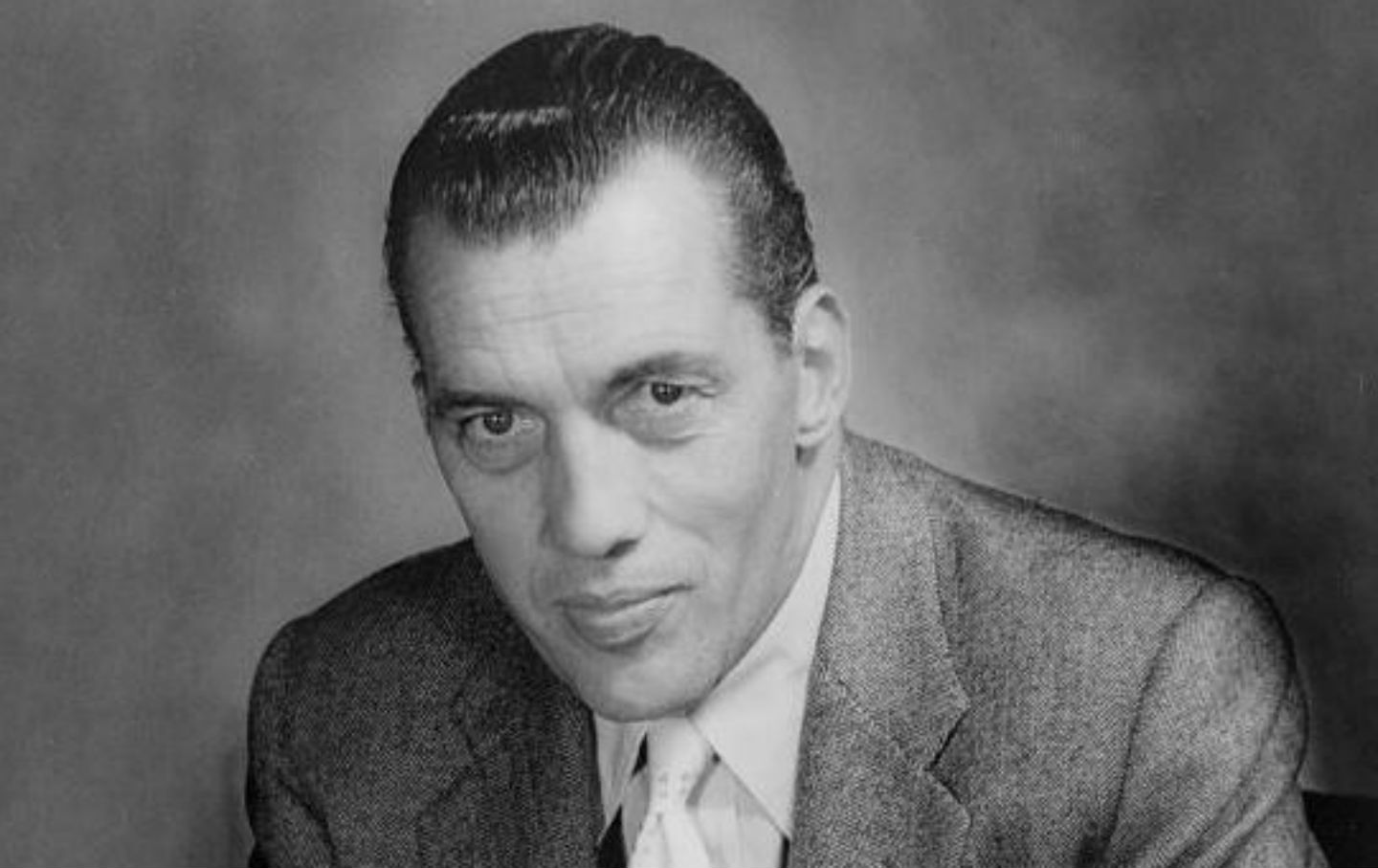
Ed Sullivan, 1954. (Library of Congress)
On this day in 1974, great American TV hero Ed Sullivan died. Our younger readers may not know much if anything about Sullivan other than the fact that he had the Beatles on his show in 1964, and so may permit their elders to enshrine him in the American pantheon for all time. This must not happen. Exhibit A: “The Gossip Columnist,” by the journalist David Cort, published in The Nation in October of 1956. Cort reveals Sullivan as a petty, patronizing, and moralizing blowhard. In response, Sullivan wrote a letter to the editor complaining that Cort’s article was “so silly that it would appear nonsensical if it had not appeared in a magazine as important as The Nation.”
Sullivan. His malevolence is almost buried from sight beneath an awesome dullness and ambition. His current series in Collier’s opened with a panegyric to the modesty of “the truly great ones,” among whom he numbered John Jacob Astor II, Winthrop Rockefeller, Jack Dempsey, and Eddie Arcaro. By great, Sullivan means useful to him.
On the other hand show business, which has a long memory, has not forgotten that Sullivan has not often helped struggling performers with a good word at the critical moment. On occasion, in his powerless days, he often did his best to destroy the powerless and vulnerable performer.…
Sullivan’s ignominious lust for power on the TV stage sets him apart from real show-business people, who when successful think themselves only lucky. As he levers and savagely defends his power, he is not above asking how he could just possibly parlay it, if things fell just so, into being President or Pope. His toadies have strange tales to tell of his ambition.
Negatively, the ambition comes clear in the story of the little TV repairman in upstate New York who made so bold as to paint on his shop front the name “Ed Sullivan TV.” The little man’s name was Ed Sullivan. The “great” Ed S. promptly sued the little Ed. S. Positively, the Sullivan afflatus can be read in his very recent public rumination on whether he, Sullivan, should forgive Ingrid Bergman for a seven-year-old adultery since regularized by marriage. Because Sullivan is not a priest, one must imagine that the thought gave him a titillation which he wanted to prolong and exploit.
To mark The Nation’s 150th anniversary, every morning this year The Almanac will highlight something that happened that day in history and how The Nation covered it. Get The Almanac every day (or every week) by signing up to the e-mail newsletter.Cort’s article was “so silly that it would appear nonsensical if it had not appeared in a magazine as important as The Nation.”
Sullivan. His malevalence is almost buried from sight beneath an awesome dullness and ambition. His current series in Collier’s opened with a panegyric to the modesty of “the truly great ones,” among whom he numbered John Jacob Astor II, Winthrop Rockefeller, Jack Dempsey, and Eddie Arcaro. By great, Sullivan means useful to him. On the other hand show business, which has a long memory, has not forgotten that Sullivan has not often helped struggling performers with a good word at the critical moment. On occasion, in his powerless days, he often did his best to destroy the powerless and vulnerable performer.…
Sullivan’s ignominious lust for power on the TV stage sets him apart from real show-business people, who when successful think themselves only lucky. As he levers and savagely defends his power, he is not above asking how he could just possibly parlay it, if things fell just so, into being President or Pope. His toadies have strange tales to tell of his ambition. Negatively, the ambition comes clear in the story of the little TV repairman in upstate New York who made so bold as to paint on his shop front the name “Ed Sullivan TV.” The little man’s was Ed Sullivan. The “great” Ed S. promptly sued the little Ed. S. Positively, the Sullivan afflatus can be read in his very recent public rumination on whether he, Sullivan, should forgive Ingrid Bergman for a seven-year-old adultery since regularized by marriage. Because Sullivan is not a priest, one must imagine that the thought gave him a titillation which he wanted to prolong and exploit.
To mark The Nation’s 150th anniversary, every morning this year The Almanac will highlight something that happened that day in history and how The Nation covered it. Get The Almanac every day (or every week) by signing up to the e-mail newsletter.
Richard KreitnerTwitterRichard Kreitner is a contributing writer and the author of Break It Up: Secession, Division, and the Secret History of America's Imperfect Union. His writings are at richardkreitner.com.